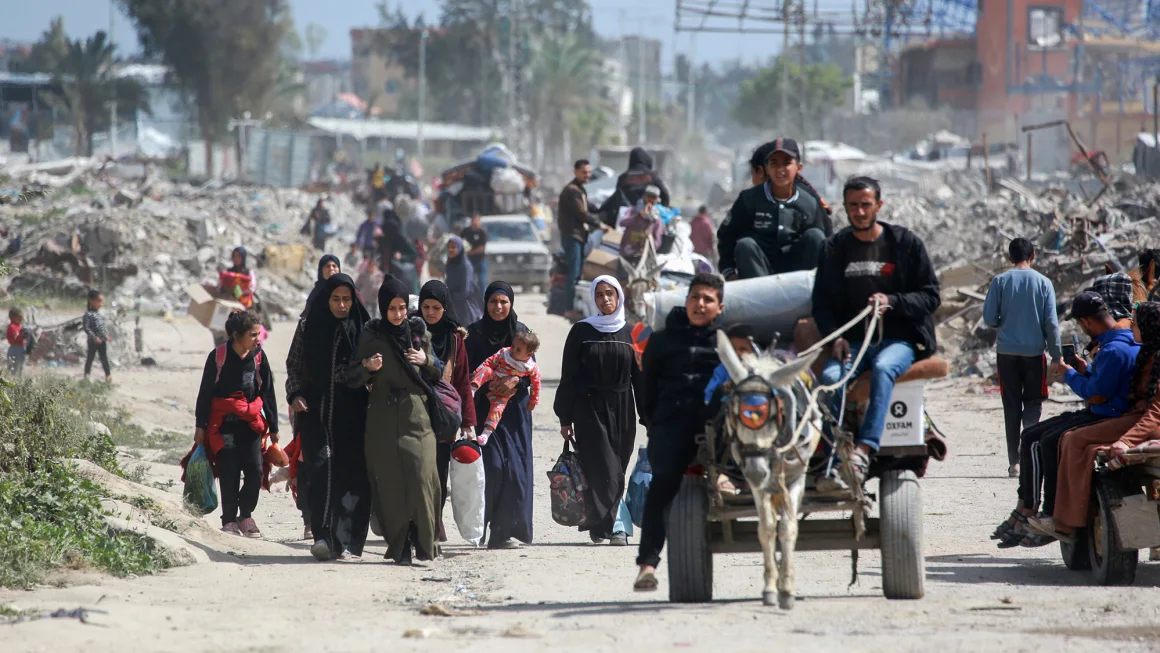Foreign
Captured Wagner soldier tells how group uses convicts as ‘cannon fodder’ against Ukraine

Captured Wagner Group soldiers who were formerly convicts have told how they were forced to walk to the frontlines in groups to scout out Ukrainian positions.

Russian President Vladimir Putin is believed to have ordered Wagner Group troops to withdraw from Ukraine. Some 50,000 mercenary troops are thought to make up the mercenary army, consisting of ex-soldiers from around the former USSR, as well as Russian convicts offered another chance at freedom should they fight. Multiple reports this week suggest that Putin is concerned that the Wagner Group poses a threat to his leadership.

The group’s founder, Yevgeny Prigozhin, is close to the president, offering the Kremlin services from his catering companies.
Prigozhin has halted the recruitment process and will withdraw his soldiers within weeks, and these men will be replaced by up to 300,000 standard Russian military troops, according to the Mirror.
But this will not put an end to the horror stories told by captured Wagner Group soldiers, often former prisoners in the Russian Federation.
In late 2022, the Security Services of Ukraine (SSU) released a video of an alleged prisoner fighting for the Wagner Group, named Vladimir Valerievich.
The Wagner Group is thought to be withdrawing from Ukraine.
The Wagner Group has operated in Ukraine since the outbreak of war in 2014.

Yevgeny Prigozhin and Putin go back years, the former having provided catering to the Kremlin (Image: GETTY)
Claiming to have been in jail under Article 105 — murder — he said Prigozhin had one day turned up at the prison he was staying at, offering to help the prisoners “wash off our sins with blood” if they fought in Ukraine.
He said he was told, “whoever stays alive gets freedom, money, and clean documents. That’s it.”
The interviewer then asked if it was true that Wagner was recruiting prisoners to use as “cannon fodder”.
Vladimir replied: “That is true. Our commander, the one who said, ‘I’ll be in charge’ when I was walking, the three of us were ahead, 30 to 40 metres, and those who walked behind me, convicts too. Then, this man walked, and he was already farther away.
“I turned, [the others] were very far.
Apparently, they wanted cannon fodder, as usual, to know where which positions are where, [and] who was standing where. That’s it. We’re like cannon fodder.”
He went on to say that the prisoners were “told a different story” when they were recruited and that they wouldn’t be sent to the front line “right away”.
Other sources have made similar claims. Website Russian Criminal reported that a former Wagner soldier as having said: “Sometimes there is an order not to wait for the shelling to end – the ‘Musicians’ [Wagner recruits] are so disciplined that they will go anyway because they stand a fighting chance of surviving.”
They said squadrons of prisoner conscripts are sent in waves, pushing the frontline closer to the Ukrainians while the shelling continues overhead from both sides.
The withdrawal of Wagner troops is happening because Putin fears Prigozhin is becoming too powerful.
The publication said the Russian President fears the Wagner boss and Chechen leader Ramzan Kadyrov hold too much sway over the embattled region, suspecting them as potential plotters against his regime.
Wagner is no stranger to Ukraine. The group came to prominence during the Donbas War in Ukraine, where it helped pro-Russian separatist forces to declare the self-proclaimed Donetsk and Luhansk People’s Republics in 2014 and 2015.
Since then, its contractors are believed to have taken part in some of the world’s most brutal and bloody contemporary conflicts, including in Syria, Libya, the Central African Republic, and Mali.
Territorial disputes in Ukraine
Wagner Group has worked in eastern Ukraine for 9 years, in Donetsk and Luhansk (Image: Express Newspapers)
In places where Wagner Group troops have been deployed, reports of war crimes and crimes against humanity, including rapes and robberies of civilians, have been prevalent.
In January, a former Wagner commander claimed asylum in Norway after deserting the group and claimed to have witnessed war crimes in Ukraine.
Ukrainian prosecutors have accused three Wagner Group mercenaries of killing and torturing civilians near Kyiv in April 2022.
German intelligence suggests that Wagner members were responsible for the massacres witnessed in Bucha in March 2022.
The Wagner Group has operated in Syria, Libya, Mali, and the Central African Republic (Image: Youtube/Telegraph)
Before Russia’s full-scale invasion of Ukraine, Wagner’s forces are only thought to have numbered around 5,000 fighters.
According to the US National Security Council, some 80 percent of its troops in Ukraine have been drawn from Russian prisons.
The group has since “stopped” recruiting prisoners, Prigozhin said in a press statement last week.
Referring to the pardon granted to those prisoners who fought, he added that all “obligations” had been fulfilled towards the convicts involved.

Foreign
Hamas claims spokesperson killed in Israeli strike on northern Gaza

Earlier this week, Israel killed Ismail Barhoum, a member of Hamas’ political office, and Salah al-Bardaweel, another senior leader.

Hamas spokesman Abdel Latif al-Qanou was allegedly killed in an Israeli airstrike on northern Gaza, Hamas-affiliated news agency Shehab reported on Wednesday night.

Al-Qanoa was one of Hamas’s most prominent spokesmen in Gaza, and while he avoided media appearances during the months of fighting, he gave multiple interviews to Arab news channels after the ceasefire.
Al-Qanoua was killed when his tent was targeted in Jabaliya, the Hamas-run Al-Aqsa television reported. The same strike wounded several people, medical sources said.
Earlier this week, Israel killed Ismail Barhoum, a member of Hamas’ political office, and Salah al-Bardaweel, another senior leader.
Both Bardaweel and Barhoum were members of the 20-member Hamas decision-making body, the political office, 11 of whom have been killed since the start of the war in late 2023, according to Hamas sources.
Tents for Palestinians seeking refuge are set up on the grounds of a United Nations Relief and Works Agency for Palestine Refugees (UNRWA) centre in Khan Yunis in the southern Gaza Strip on October 19, 2023, amid the ongoing battles between Israel and the Palestinian group Hamas (credit: MAHMUD HAMS/AFP via Getty Images)
The IDF has yet to comment on the alleged elimination.
Increased IDF pressure in the Gaza Strip
Since fighting in Gaza was renewed at the beginning of last week, the IDF has killed 150 terrorists, including 10 top Hamas officials, The Jerusalem Post learned Tuesday.
In certain areas, the military has entered a full kilometer into Gaza, such as around the Nitzanim Corridor in central Gaza.
In addition to central Gaza, Beit Lahia, Beit Hanoun, parts of Khan Yunis, Shaboura, and Tel Sultan, the IDF has been evacuating and moving into Jabaliya.

Foreign
Dead Nigerians, Africans, others without will may lose unclaimed estates in UK

Hundreds of unclaimed estates reveal untold stories of African migration, wealth, and family ties left behind.
Thousands of people die every year in the United Kingdom without leaving a will or identifying next of kin, and among them are many Nigerians and other Africans whose estates—ranging from property to savings—remain unclaimed.
The UK government’s latest list of unclaimed estates, updated daily, includes over 170 entries connected to African-born individuals, with Nigerians making up a significant portion of the cases.

A Legacy Lost
For many migrants, the UK became a home away from home—a land of opportunity where they built wealth, purchased property, and created a life.

However, the absence of a will often results in their assets being classified as “bona vacantia” (ownerless goods), leaving them to the custody of the Crown.
Families back in Africa are frequently unaware of these estates, leading to a permanent loss of assets.
Cases like that of Adenike Adebiyi, who passed away in Hackney, London, in 2004, or Solomon Adekanmibi, who died in Colchester, Essex, in 2021, highlight the consequences of dying intestate.
With no identified next of kin or missing documentation, their estates remain unclaimed, and their legacies risk being forgotten.
Why It Matters
This phenomenon underscores a critical issue: many African families are unaware of their relatives’ financial situations abroad.
Migration often disrupts communication, and without clear documentation, the wealth built overseas remains beyond reach.
The loss isn’t just financial—it’s deeply cultural and emotional. Unclaimed estates represent untold family histories, connections, and the struggles of migrants who built their lives in the diaspora.
The Challenges
Lack of Awareness:
Most families in Nigeria and other African countries are unaware of their relatives’ estates abroad or how to access them.
Genealogical Gaps:
The information provided in official records is often incomplete. For example, many entries in the UK unclaimed estates list lack detailed family history or next-of-kin information.
Cultural Hesitations:
In many African cultures, discussing death and wills is considered taboo, leading to reluctance in planning for asset distribution.
A Call to Action
African governments, community organizations, and legal professionals need to raise awareness about this issue.
Here’s what can be done:
Encouraging Will Writing: Migrants in the diaspora should be educated about the importance of drafting wills to protect their assets.
Genealogical Support: Families in Africa can be assisted in tracing unclaimed estates through local or international partnerships.
Public Awareness Campaigns: Social and traditional media can highlight the importance of estate planning and share resources for families.
How to Check the List
The UK government maintains a public Unclaimed Estates List that is updated daily.
Families can search the list by name, place of birth, or other identifiers to check for potential claims.
Final Thoughts
For many Nigerians and Africans in the UK, their unclaimed estates represent more than just wealth—it’s a story of migration, resilience, and identity.
By addressing this growing issue, families can reclaim their heritage, and the legacy of those who journeyed to the diaspora need not be forgotten.
Here is the latest daily update as of March 24, 2025. Check the list

Foreign
Israel approves controversial proposal to facilitate emigration of Palestinians from Gaza

Israel’s security cabinet has approved a controversial proposal to facilitate Palestinian emigration from Gaza, a move critics warn could amount to ethnic cleansing.

Israeli Finance Minister Bezalel Smotrich on Sunday said the security cabinet approved the proposal by Defense Minister Israel Katz to organize “a voluntary transfer for Gaza residents who express interest in moving to third countries, in accordance with Israeli and international law, and following the vision of US President Donald Trump.”

The decision marks a remarkable endorsement of a plan once considered a far-right fantasy – and comes despite the prime minister’s earlier pledge not to permanently displace Gaza’s civilian population.
Critics have said that any mass displacement of Gazans in the midst of a devastating war would amount to ethnic cleansing, an act associated with war crimes and crimes against humanity under international law. Israeli officials have countered that emigration would be voluntary and in line with international legal standards.
But aid groups argue that Israel’s war has made life in Gaza nearly impossible. Martin Griffiths, the United Nations’ top emergency relief official, has called the enclave “uninhabitable,” saying its people are “witnessing daily threats to their very existence.”
The Israeli approval would establish an administration within the defense ministry “to prepare and facilitate the safe and controlled movement of Gaza residents who wish to voluntarily move to third countries,” according to a statement from the defense ministry.
Its work would include “establishing movement routes, pedestrian checks at designated crossings in the Gaza Strip,” and infrastructure to enable people to leave.
Israeli officials have presented the plan as a fulfillment of a desire by Trump to take over Gaza, expel its Palestinian population to neighboring countries and turn it into a Middle Eastern “riviera.”
The Palestinian Authority’s Minister of State for Foreign Affairs Varsen Aghabekian Shaheen told CNN’s Becky Anderson last month that Palestinians “are steadfast to stay in their land and will not move.”
Trump’s ‘vision’
Katz said Sunday that Israel is using “all means to implement the vision of the US president,” according to the defense ministry statement.
This month, Trump appeared to backtrack on his comments about displacing Palestinians, telling reporters that “nobody is expelling any Palestinians.” Steve Witkoff, the US special envoy to the Middle East, said last month that the US initiative to rebuild Gaza won’t necessarily amount to an “eviction plan” and that it was designed to “shake up everybody’s thinking.”
Last year, Israeli Prime Minister Benjamin Netanyahu said his country had no intention to displace Palestinians or occupy Gaza.
Related articleTrump says ‘nobody is expelling Palestinians,’ weeks after saying they should be moved to Arab states
“I want to make a few points absolutely clear: Israel has no intention of permanently occupying Gaza or displacing its civilian population,” Netanyahu said in a video statement in January 2024.
Trump’s proposal has, however, brought the idea further into the mainstream, with Israeli politicians now openly discussing mass emigration of Gazans as a solution to the war. And Katz last week said that Israel may maintain a permanent presence in the enclave.
Israeli rights group Peace Now criticized the plan, saying “the establishment of the administration to expel Palestinians from Gaza is one of the stupidest moves by a government that has lost all direction and logical thinking.”
The prospect has also drawn sharp rebuke from Arab leaders, especially Egypt and Jordan, who would be expected to absorb the large number of expelled Palestinians. Experts have also warned that displacing Palestinians would further destabilize the region and threaten the security of neighboring states.
Smotrich said Sunday that the security cabinet also approved the expansion of Jewish settlements in the occupied West Bank, noting that 13 areas in the West Bank would be split from existing settlements and would be recognized as independent settlements.
“Instead of hiding and apologizing – we are raising the flag, building, and settling. This is another important step on the path to actual sovereignty in Judea and Samaria,” he said, using the name by which Israelis refer to the West Bank.
The Yesha Council, an umbrella body representing Jewish settlements, said that as of January 2024, there were 150 settlements in the West Bank.
It said that the decision exposes a “long-standing lie that (Israel) does not establish new settlements, but only ‘neighborhoods’ of existing settlements” and that it is “another nail in the coffin that the Government of Israel is preparing for the only chance for a future of peace and security.”
A statement sent by Smotrich’s office said the move comes against “the backdrop of the approval of tens of thousands of housing units in Judea and Samaria and represents another significant step in the process of normalizing and regulating the settlement.”
Smotrich and other right-wing ministers have been pushing an aggressive expansion of settlements on the path to declaring Israeli sovereignty over the West Bank, which would be in defiance of international law and UN Security Council resolutions.
Israel says it will maintain ‘permanent’ presence in Gaza unless hostages are freed

-

 Security3 days ago
Security3 days agoNew Commissioner of Police in Niger, Elleman sends strong warning to criminals
-

 Foreign1 week ago
Foreign1 week agoHouthis declare Ben-Gurion Airport ‘no longer safe’ after renewed Gaza fighting
-

 News3 days ago
News3 days agoKogi Governor, Ahmed Usman Ododo salutes Tinubu at 74
-

 News1 day ago
News1 day agoAbia: LG Chairman, Iheke accused of using soldiers to detain IRS agent, claims Governor Otti’s support
-

 News1 week ago
News1 week agoUmeh denies receiving $10,000 with other 42 Senators to support state of emergency in Rivers
-

 News3 days ago
News3 days agoPlateau LP stakeholders endorses Barr Gyang Zi’s defection to APC
-

 Sports1 week ago
Sports1 week ago2026 World Cup Race: Ekong says Eagles feel great to be back in contention
-

 News3 days ago
News3 days agoAkpabio pays historic visit to office of SA to President on Senate Matters





















